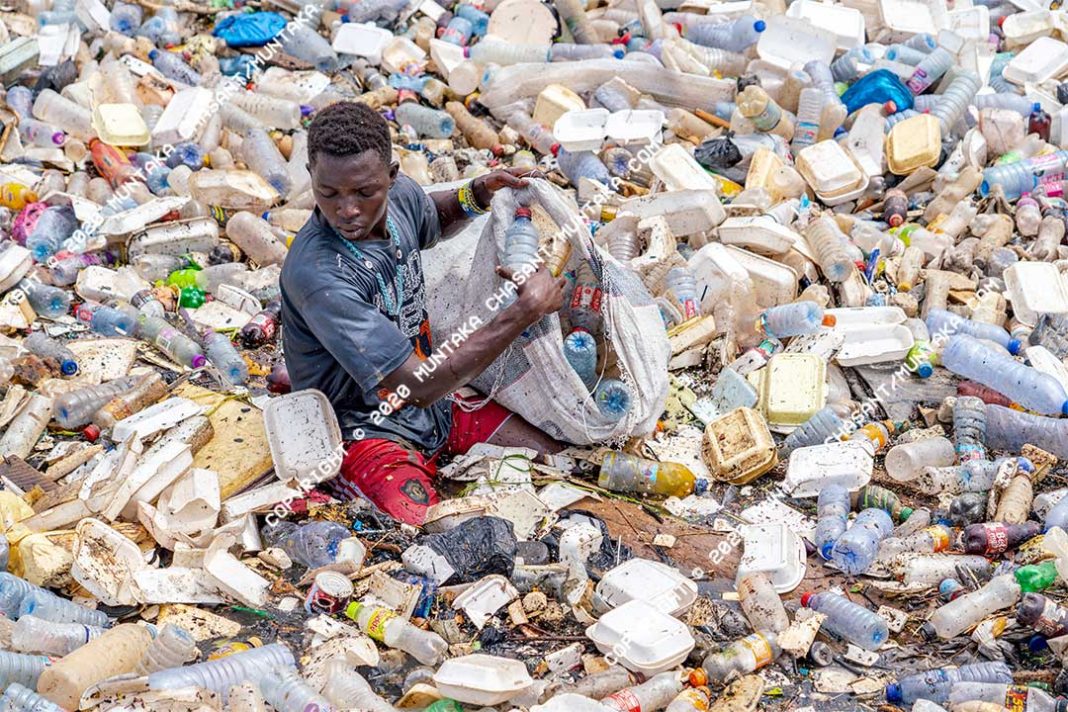Plastic waste management is a critical issue in the Upper East Region. Despite people knowing the hidden threats it brings to the environment and humanity; they are still reluctant to adhere to proper handling and disposal of plastic products.
The use of plastic products has become part of the people in the region to the extent that in every gutter and street one passes, there are traces of plastic waste.
Elijah Ayinsakiya, is a resident in the Kalbeo community, a suburb of Bolgatanga. Mr. Ayinsakiya has suffered the effects of plastic waste as two of his goats died from chewing plastic rubbers.
The sad incident, however, propelled Ayinsakiya who is just in his early 20s, to begin suggesting measures that authorities can adopt to reduce the use of plastic products in various communities.
According to him, authorities should ban or limit the use of plastic products to save the environment, his animals and animals of others.
“…just look everywhere, [there] is plastic waste. Authorities have to come out with solutions that can limit the use of plastic products. I cannot continue to lose my animals. Now, it is my animals but who knows, soon; it could be me or my children yet unborn. So, authorities have to be up and doing to help save the environment”, he said.
Plastics are non-biodegradable and stay in the environment forever. Plastics do not decompose, the reason it is a threat to both animals and the environment.
Countries such as Kenya, Zimbabwe, Canada, and others have pledged to “significantly reduce” the use of plastic waste by 2030. These countries have already imposed rules on certain single-use plastics.
The residents have blamed their reluctance to adhere to proper handling and disposal of plastics on the lack of proper education.
Sylvester Alokabila, another resident in the Bolgatanga Municipality noted that said the Environmental Health and Sanitation Department should be ashamed for its failure to properly educate people on how to handle and dispose of plastic waste.
According to him, he has never seen officials from the department going around educating people on how to dispose of their plastic waste in the communities.
Robert Awuni, a resident in the Bongo District also noted that authorities both the sanitation department and other stakeholders in sanitation ought to put measures in place to punish people who use plastic products abusively.
But the assertion by the residents, the acting Director of the Environmental Health and Sanitation Department in the Upper East Region, Juventus Asangyuure has said is far from reality.
Mr Asangyuure noted that poverty plays a key role in waste management. He explained that a majority of people usually fail to pay for their dustbins to be collected when they are full of garbage.
He said, “as an outfit, we have donated some dustbins to some individuals but anytime my people go there to empty such bins for a little pay, they usually get turned away by them with the saying that they do not have money to pay. Sometimes, some of them will go to the extent of burning waste inside the bins. Some too, on our monitoring, we have realised that they have collected the bins and used them to store other things in contrary to the purpose of the bins. The issue is far from educating, and I think it is all about poverty.”
The Upper East Regional Minister Stephen Yakubu, for his part, noted that government is liaising up with the private sector to fully address the concerns of plastic waste.
According to him, the government has provided opportunities to private investors that can use plastic waste as raw materials to come and invest.
“The likes of Zoomlion Ghana is doing it best and I think more are coming. So, let us, in our little ways see how we can assist the government to fight this canker, plastic waste is an issue but together we can solve it. Countries like Morocco and others are doing it, and I think we can also do it. Let us focus on the reusable of plastic products and with that, we can limit plastic waste.”
But until then, the minister said residents and commuters should adopt safer practices of plastic waste management to avoid abusing plastic products.
Plastic waste management will continue to be a matter of concern and the time to act and focus on reducing, reusing, and recycling plastic waste is now.
Source:A1radioonline.com|101.1 MHz|Moses Apiah|Ghana





